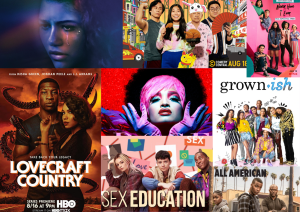Introduction
The Media and Entertainment Industry is always changing, with new ideas and technology shaping the way we watch TV, movies, and play games. In this article, we will look at 10 important trends that are changing the Media Entertainment Industry. These trends are making entertainment more exciting and accessible for everyone.
Top 10 Trends in the Media and Entertainment Industry
1. The Growth of Streaming Services

Streaming platforms like Netflix, Disney+, and Amazon Prime have become a huge part of how we watch TV shows and movies. With streaming, people can watch what they want, when they want, without being tied to a specific schedule.
Key Points:
- More Choices: People now have many options for entertainment, from movies to TV shows.
- Original Content: Streaming services are creating their own shows and movies, which gives viewers something unique to enjoy.
2. Artificial Intelligence in Content Creation

Artificial Intelligence (AI) is helping create and personalize content. AI is used for making recommendations, writing scripts, and even editing videos.
Key Points:
- Personalized Recommendations: Streaming services use AI to suggest shows and movies based on what you’ve watched before.
- AI-Assisted Creation: AI is now used to help in creating content, making the process faster and more efficient.
3. Interactive Storytelling

With new technology like virtual reality (VR) and augmented reality (AR), stories are becoming more interactive. Viewers can now be part of the story, making their entertainment experience more engaging.
Key Points:
- Immersive Experiences: VR and AR are being used in films and video games to create a more interactive experience.
- Choose-Your-Own-Adventure: Shows and movies where viewers can decide what happens next, like Black Mirror: Bandersnatch, are becoming more popular.
4. E-Sports and Gaming Content

E-sports, or competitive video gaming, has become a massive industry. Millions of people now watch others play video games, and gaming platforms like Twitch and YouTube Gaming have become key parts of the entertainment world.
Key Points:
- Gaming as Entertainment: Watching professional gamers compete in tournaments is now a major form of entertainment.
- Streaming Games: Platforms like Twitch allow gamers to stream their gameplay for others to watch live.
5. Social Media’s Impact on Entertainment

Social media platforms like TikTok, Instagram, and YouTube are changing how we discover and enjoy entertainment. Influencers and creators are shaping trends and promoting entertainment in new ways.
Key Points:
- Viral Content: Social media allows anyone to share content, which can quickly go viral and gain millions of views.
- Influencer Culture: Social media stars are now some of the biggest celebrities, influencing everything from fashion to entertainment.
6. More Diversity in Media

Audiences are asking for more diverse stories and characters. TV shows and movies are now including people from different races, cultures, and backgrounds, making entertainment more relatable to a global audience.
Key Points:
- Inclusive Casting: More movies and TV shows are featuring characters from different backgrounds.
- Global Stories: Stories are being told from a wider range of perspectives, which allows viewers to connect with characters from around the world.
7. Virtual Influencers and Digital Celebrities

Virtual influencers are computer-generated characters that act like real people and promote products or brands. These digital celebrities are growing in popularity, especially among younger audiences.
Key Points:
- AI-Generated Celebrities: These influencers are created using technology and have huge followings, just like real-life celebrities.
- Brand Partnerships: Brands are starting to use virtual influencers to promote products, offering a new type of marketing.
8. The Changing Role of Movie Theaters

Although streaming services are popular, movie theaters are trying to stay relevant by offering better experiences. Theaters are focusing on providing high-quality, comfortable experiences to draw viewers away from their homes and back into theaters.
Key Points:
- Premium Viewing: Movie theaters are offering better seating, IMAX screens, and 4D experiences to make going to the movies more enjoyable.
- Hybrid Releases: Some movies are being released in theaters and on streaming platforms at the same time, giving viewers more choices.
9. Sustainable Practices in Film and TV Production

The entertainment industry is becoming more environmentally conscious. Productions are now using eco-friendly practices to reduce waste and energy use during filming.
Key Points:
- Green Filmmaking: Studios are adopting practices like using recycled materials and reducing energy consumption.
- Eco-Friendly Content: Films and shows are starting to include messages about sustainability and environmental issues.
10. Blockchain Technology in Entertainment

Blockchain technology, which is most known for cryptocurrencies like Bitcoin, is starting to impact the entertainment world. It’s being used to protect digital rights and create new ways for creators to earn money.
Key Points:
- Digital Rights: Blockchain helps protect the ownership of digital content, ensuring creators are paid fairly.
- NFTs: Non-fungible tokens (NFTs) are a new way to buy and sell unique digital items, such as art or music, in the entertainment world.
The Rise of Mobile Gaming

Mobile gaming has become very popular in recent years. Many people play games on their phones or tablets, making gaming more accessible. Popular games like Candy Crush and Pokémon Go can be played anywhere, making it easy to enjoy gaming on the go.
Why It’s Growing:
- Mobile games are easy to download and free to play, attracting more people.
- Phones are more powerful now, allowing for better game experiences.
Live Streaming of Events
Live streaming has changed how we watch events like concerts, sports, and even everyday activities. Platforms like YouTube, Instagram, and Facebook make it easy to watch events live from anywhere in the world.
Why It’s Popular:
- People can watch events in real-time without needing to be there in person.
- It allows audiences to connect with their favorite stars or events in a more personal way.
Podcasts and Audio Content

Podcasts are becoming a favorite way for people to learn and be entertained. With so many topics available, people can find podcasts about anything they like, from true crime to comedy to business advice. Listening to podcasts has become a part of everyday life for many.
Why It’s Growing:
- Podcasts can be listened to anytime, making them convenient.
- People enjoy hearing stories or discussions while driving, exercising, or relaxing at home.
Virtual Reality (VR) in Entertainment
Virtual reality (VR) is changing how we experience entertainment. With VR headsets, people can enter a fully immersive world. Whether it’s for gaming, movies, or virtual tours, VR offers a new way to experience content.
Why It’s Exciting:
- VR allows users to feel like they are part of the action, whether they are fighting monsters in a game or exploring a new world.
- It’s becoming more affordable, making it easier for people to try out VR.
The Impact of AI on Music Creation
AI is not just helping with movie and TV content, it’s also being used in music creation. Musicians and producers are using AI tools to create new sounds and even help write songs. This is making the music industry more creative and efficient.
Why It’s Important:
- AI can help create music faster and even suggest new ideas to musicians.
- It allows for new kinds of music that may not have been possible before.
The Growth of YouTube and User-Generated Content

YouTube has become a huge platform for sharing videos. People of all ages can upload videos and get millions of views. This has led to the rise of influencers and creators who build their own audiences and even make money from ads and sponsorships.
Why It’s Popular:
- YouTube is free to use and offers content for every interest, from DIY tutorials to comedy skits.
- Anyone can be a creator, making it more inclusive and diverse.
Changing Ways to Watch Sports
The way we watch sports is changing. More people are watching sports online through streaming platforms rather than on traditional TV. These platforms often offer live coverage, highlights, and even unique angles that weren’t available before.
Why It’s Changing:
- Fans can watch sports on their phones, tablets, or computers, making it more convenient.
- Streaming services allow viewers to choose how and when they watch games, offering more flexibility.
Challenges in the Media Entertainment Industry
The Media and Entertainment Industry faces some challenges, like dealing with too many choices for consumers, ensuring fair pay for creators, and managing the impact of new technology. These issues need to be addressed for the industry to keep growing.
What’s Hard:
- There’s so much content available that it can be overwhelming to choose.
- With technology advancing, some traditional jobs and skills are at risk.
- It’s important to ensure creators are paid fairly for their work.
The Future of Media and Entertainment

The future of entertainment will likely focus on more personalized experiences, advanced technology like virtual reality, and even more diversity in content. As technology improves, the way we experience entertainment will only get better.
What’s Coming:
- Streaming services will continue to grow and offer more options.
- Interactive content like VR and AR will be more common.
- Content will become more diverse, reflecting a wider range of voices and experiences.
Comparative Table: Traditional vs. New Media Entertainment
| Aspect | Traditional Media | New Media Entertainment |
|---|---|---|
| Content Delivery | TV, Cinema, Radio | Streaming, Social Media, E-sports |
| Revenue Models | Subscription, Ads, Ticket Sales | Subscriptions, Microtransactions, NFTs |
| Audience Interaction | One-way communication (TV, Radio) | Interactive, User-generated Content |
| Content Creation | Studios, Networks, Publishers | Independent Creators, Digital Platforms |
| Technology Integration | Limited tech integration | AI, VR, AR, Blockchain, and more |
Analysis Table: Key Trends in Media Entertainment
| Trend | Impact on Industry | Future Outlook |
|---|---|---|
| Streaming Platforms | Disrupting traditional TV models | Continued growth and global expansion |
| AI in Content Creation | Enhancing creativity and efficiency | Growing influence in all stages of production |
| Interactive Storytelling | Engaging viewers in new ways | Increased use of VR/AR in entertainment |
| E-sports and Gaming | Attracting new audiences, revenue | Mainstream growth and more sponsorships |
| Social Media Influence | Empowering creators, shaping trends | More collaboration between platforms and creators |
| Diversity and Representation | Reflecting society’s changes | More authentic and inclusive stories |
| Virtual Influencers | Changing celebrity culture | More brands and industries adopting virtual influencers |
| Movie Theaters in Streaming Era | Offering premium experiences | Hybrid models becoming the norm |
| Sustainability in Production | Reducing environmental impact | Growth in eco-friendly content creation |
| Blockchain in Entertainment | Securing digital rights and ownership | NFTs and blockchain technologies shaping content |
Conclusion
The Media and Entertainment Industry is undergoing massive changes. From the growth of streaming platforms to the rise of virtual influencers, technology and changing audience expectations are driving these shifts. Keeping track of these trends will help consumers and businesses understand where the industry is headed, allowing them to make informed decisions about the future of entertainment.




